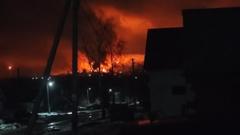Ten years have gone by since the heart-wrenching attack on a military-run school in Peshawar, Pakistan, that left 150 dead—many of whom were children. The anniversary has stirred up deep reflections on the subsequent quiet but temporary improvements in Pakistan's security landscape, which are now under threat as terrorist activities swell anew. A grieving parent, Ajoon Khan, still recalls the harrowing scenes from that day and fears that the sacrifices made in the past may have been in vain, as rising violence from the Pakistani Taliban and other militant groups reverberates across the country.
Terror Resurgence in Pakistan: A Decade After the Peshawar School Attack

Terror Resurgence in Pakistan: A Decade After the Peshawar School Attack
Pakistan grapples with renewed terrorism threats as the memory of a devastating school attack lingers a decade later.
The political structure in Pakistan, marked by instability and weak governance, has failed to exert control over the situation, giving rise to a resurgence of violence, particularly in Khyber Pakhtunkhwa and Baluchistan provinces. Experts note that the shift in power dynamics following the Taliban takeover in Afghanistan has emboldened the Tehrik-i-Taliban Pakistan (T.T.P.), effectively transforming the group into a more lethal organization that operates with access to advanced weaponry. Restrictive economic constraints and dwindling public support hinder robust counterterrorism operations, leaving a vacuum that militant factions are quick to exploit.
Statistics reveal grim realities: in the past ten months, the Interior Ministry’s reports indicated 924 deaths from 1,566 terrorist attacks, underscoring a dangerous trend. Families and communities in affected regions are shaken, drawing parallels between the current state of affairs and the traumatic events of a decade past.
Despite Pakistan’s historical military efforts to contain extremism—a costly endeavor that, while initially successful, has now become less politically feasible—concerns remain high over the potential repercussions of terrorism against both civilians and foreign investments, particularly from China. As responses intensify to address these security challenges, many in Pakistan are left questioning whether the lessons from the past have truly been learned or if another tragedy is looming on the horizon.
Statistics reveal grim realities: in the past ten months, the Interior Ministry’s reports indicated 924 deaths from 1,566 terrorist attacks, underscoring a dangerous trend. Families and communities in affected regions are shaken, drawing parallels between the current state of affairs and the traumatic events of a decade past.
Despite Pakistan’s historical military efforts to contain extremism—a costly endeavor that, while initially successful, has now become less politically feasible—concerns remain high over the potential repercussions of terrorism against both civilians and foreign investments, particularly from China. As responses intensify to address these security challenges, many in Pakistan are left questioning whether the lessons from the past have truly been learned or if another tragedy is looming on the horizon.




















